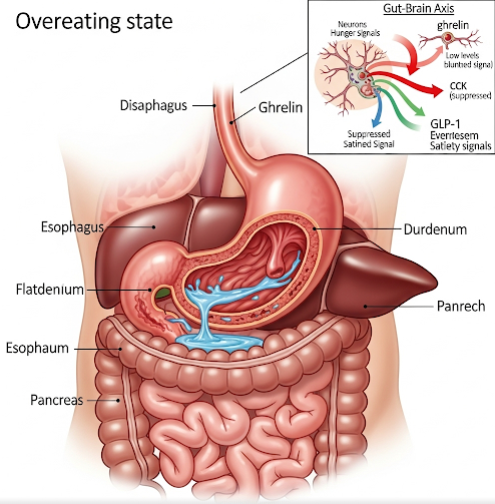Overview
Overeating refers to consuming more food than the body needs, often leading to discomfort, weight gain, and various health problems. It can be occasional or chronic and may be influenced by emotional, psychological, or environmental factors. In Korea, awareness about healthy eating habits and access to nutritional counseling and behavioral therapies help individuals manage overeating and its consequences.
What is Overeating?
Overeating occurs when a person consistently consumes excess calories beyond their body’s energy requirements. This behavior can be a symptom of underlying issues such as emotional stress, binge eating disorder, or poor dietary habits. Over time, overeating can contribute to obesity and metabolic diseases.
Symptoms
Signs and symptoms of overeating include:
- Feeling uncomfortably full after meals
- Frequent episodes of consuming large amounts of food in a short time
- Weight gain and difficulty losing weight
- Feelings of guilt or loss of control related to eating
- Digestive discomfort such as bloating or indigestion
Causes
Overeating can be caused by:
- Emotional triggers such as stress, anxiety, or depression
- Habitual eating patterns or social situations
- Hormonal imbalances affecting hunger and satiety signals
- Highly palatable, calorie-dense foods that promote overeating
- Eating disorders like binge eating disorder
Risk Factors
Risk factors for overeating include:
- Psychological conditions such as depression or anxiety
- Sedentary lifestyle
- Easy access to high-calorie foods
- Poor sleep quality
- Genetic predisposition to obesity or metabolic disorders
Complications
Complications of chronic overeating may include:
- Obesity and related conditions like type 2 diabetes and cardiovascular disease
- Gastrointestinal issues such as acid reflux or fatty liver disease
- Mental health challenges including low self-esteem and eating disorders
- Increased risk of metabolic syndrome and certain cancers
Prevention
Preventing overeating involves:
- Developing mindful eating habits and portion control
- Managing stress through relaxation techniques and counseling
- Maintaining regular physical activity
- Seeking professional help for underlying emotional or psychological issues
- Creating a balanced diet with nutrient-rich foods
Treatment Options in Korea
In Korea, treatment for overeating focuses on:
- Nutritional counseling: Dietitians provide personalized meal plans and education
- Behavioral therapy: Cognitive-behavioral therapy (CBT) to address emotional eating patterns
- Medical evaluation: To identify and manage hormonal or metabolic contributors
- Support groups: Community programs for motivation and accountability
- Weight management programs: Combining diet, exercise, and psychological support
Korean healthcare facilities integrate multidisciplinary approaches, including modern psychological and nutritional services, to help individuals overcome overeating and promote long-term health.













